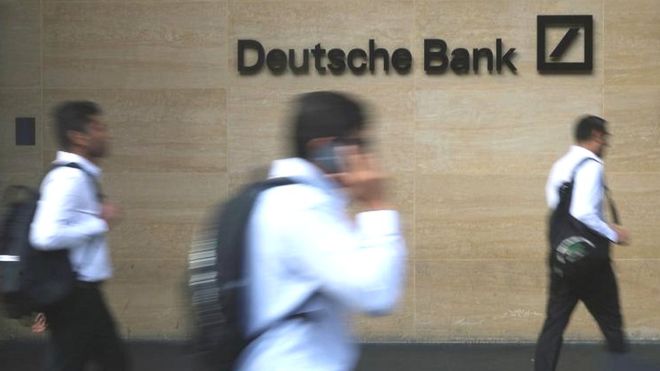
Deutsche Bank has made the first of the 18,000 job cuts announced on Sunday as part of a radical reorganisation.
Staff working in share trading in London, New York and Tokyo were told that their jobs were going.
In London, some staff stayed away from work after being told their passes would stop working at 11:00.
A spokesperson said the aim of the changes, which will shrink its investment banking business, was to make the bank “leaner and stronger”.
Deutsche Bank is yet to specify the details of the job cuts, but it will pull out of activities related to trading shares, much of which takes place in London and New York.
Deutsche Bank’s equities business in Asia is managed out of Hong Kong, but a spokesperson declined to comment on the impact the bank reorganisation would have on job numbers in Asia.
With almost 8,000 staff, Deutsche Bank is one of the biggest employers in the City of London.
Outside the bank’s London HQ staff have been seen speaking on their phones – with some visibly upset – just hours after arriving at work.
Some workers have been sent home while others are still waiting to find out whether their jobs are at risk.
‘Painful but unavoidable’
“We will retain a significant presence here and remain a close partner to our UK clients and to international institutions that want to access the London market,” Deutsche Bank said in a statement on Monday.
In a conference call, Deutsche Bank chief executive Christian Sewing declined to give regional breakdowns of the job cuts, but confirmed that the process of informing those affected had already begun.
He described the job losses as “painful but unavoidable to ensure Deutsche Bank’s long-term success”.
Shares in Deutsche Bank were down more than 5% on Monday as investors reacted to the shake-up.
What is the bank doing?
Deutsche Bank said it would cut its global workforce to 74,000 by 2022, part of a reorganisation that will cost the company €7.4bn ($8.3bn; £6.6bn) over the next three years.
It will also report a second-quarter loss of €2.8bn, partly due to the costs of the shake-up.
A Deutsche Bank spokesperson said: “We have decided to focus our resources on businesses where clients need us most.
“We are setting up a dedicated corporate bank specialising in the financing and treasury products the world’s companies need to support trade and investment around the globe.
“Deutsche Bank will remain an international bank. That’s what our clients need.”
What do the staff who are losing their jobs actually do?
Basically, they buy and sell shares on behalf of clients and companies.
Transactions may include buybacks, when a company wants to repurchase its own stock as a way of returning money to shareholders, or rights issues, when a company needs to raise cash on the capital markets.
This sector of banking, the equities business, is one area in which Deutsche Bank has decided it is just not competitive enough.
Mr Sewing told journalists on Monday that the aim was to create “a bank that competes to win”.
He added: “If we can’t compete with the best, we won’t be in the game.”
What went wrong?
The reorganisation of the business follows the failure of merger talks with rival Commerzbank in April.
The German government had supported the tie-up, hoping it would create a national champion in the banking industry.
However, both banks concluded that the deal was too risky, fearing the costs of combining might have outweighed the benefits.
Deutsche Bank has been struggling for years with the decline of its investment bank and has made several attempts to revamp its business.
The latest plan, the most ambitious so far, has already prompted the resignation of one top executive.
On Friday, the bank announced that its head of investment banking, Garth Ritchie, was leaving.
Source: BBC

